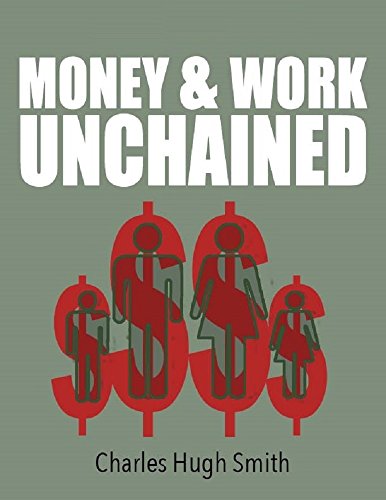This is the predictable path because it’s the only one that’s politically expedient and doesn’t cause much financial pain until it’s too late to stave off collapse.
While many fear a war between the nuclear powers or the breakdown of civil order, I tend to think the Crisis of 2023-26 is more likely to be financial in nature.
War and civil breakdown are certainly common enough in history, global/nuclear war has been avoided in recent history, largely because wars are typically launched by those who reckon they can win the war. Launching a nuclear strike against a nation with the ability to launch a counterstrike (from submarines, for example, and missiles that survived the first strike) guarantees the destruction of whatever concentrations of population and assets the attacker may have.
The breakdown of civil order has not occurred in developed-world nations for quite some time, as central states can marshal military forces to restore order and issue / borrow money to buy the compliance of the restive populace.
Financial crises, in contrast, remain a constant feature of the modern era, and developed-world nations are perhaps even more vulnerable to financial disorder than developing nations.
 Check Amazon for Pricing.
Check Amazon for Pricing.
As I’ve often noted, systems tend to follow an S-Curve of rapid expansion followed by slower growth during maturity and culminating in stagnation, decline or collapse.
Successful economies generate a double-bind once they reach the stagnation-decline phase: the populace (and capital) both expect strong permanent growth as a birthright, and they see the previous boost-phase and maturity phase as evidence that the economy “should” continue delivering outsized returns on capital and widespread prosperity essentially forever.
They are willing to accept a temporary slowdown/decline as part of the process of prosperity, but their patience quickly runs out if outsized returns and general prosperity aren’t forthcoming.
The stagnation phase has many causes: a reduction in resources or depletion of soil/water resources; a sustained shortage of energy or a sharp rise in the cost of energy; stagnating productivity, and the rise of parasitic elites, insiders who feather their nests at the expense of the many.
All of these factors act as friction in the system, and eventually the system is unable to sustain the parasitic elites, high returns on capital and general prosperity.
Any political elite that delivers the bad news that prosperity is over risks being overthrown or voted out of office, and so the ruling elites seek to extend high returns on capital and general prosperity by any means available.
Since they are the parasitic elites, eliminating that source of friction is off the table. Restoring depleted soil/water/energy resources is not possible, and wresting control of others’ resources to exploit is problematic: using force might trigger a wider war, so buying others’resources is the safer answer.
 Get a Job, Build a Rea...
Buy New $6.95
(as of 04:50 UTC - Details)
Get a Job, Build a Rea...
Buy New $6.95
(as of 04:50 UTC - Details)
Modern states create new currency by either digital “printing” or borrowing the money into existence. There is little political resistance to creating new money to buy others’ resources, generate high returns on capital and deliver direct transfers of cash to the populace via “make work” employment, social welfare, Universal Basic Income, etc.
You see the double-bind: the ruling class must deliver outsized returns on capital and general prosperity, and the only way they can do so is to create new money rather than new wealth, something that is beyond their power.
Depending on the wealth and productivity of the existing economy, the world may accept this new money as having value for a time. But as the need for more currency increases, ruling elites start to “print” or borrow new currency in excess of what the economy actually generates in income and value.
Eventually the world catches on to the stealth devaluation of the money, and trust in the value of the currency drops, slowly at first and then precipitously.




